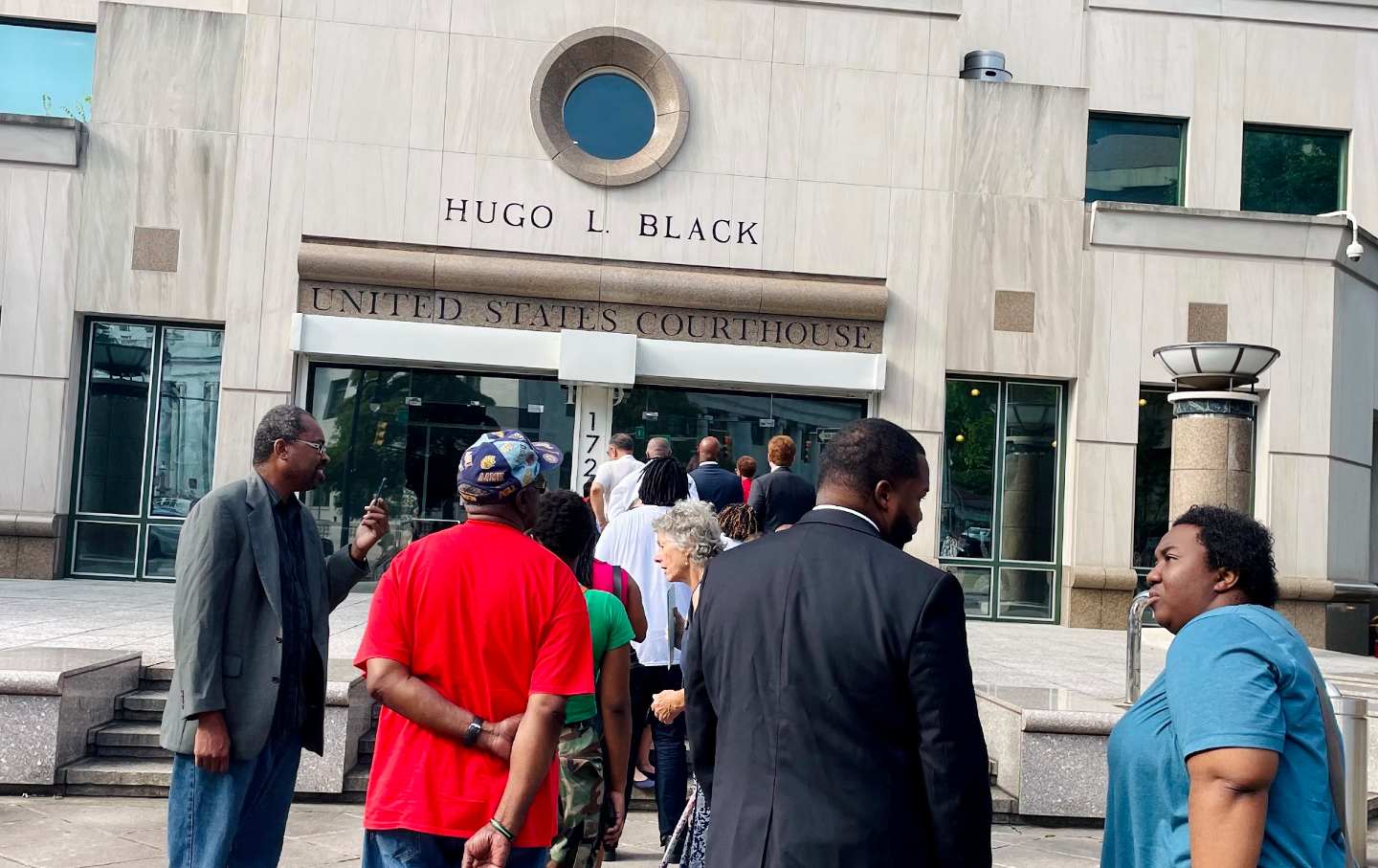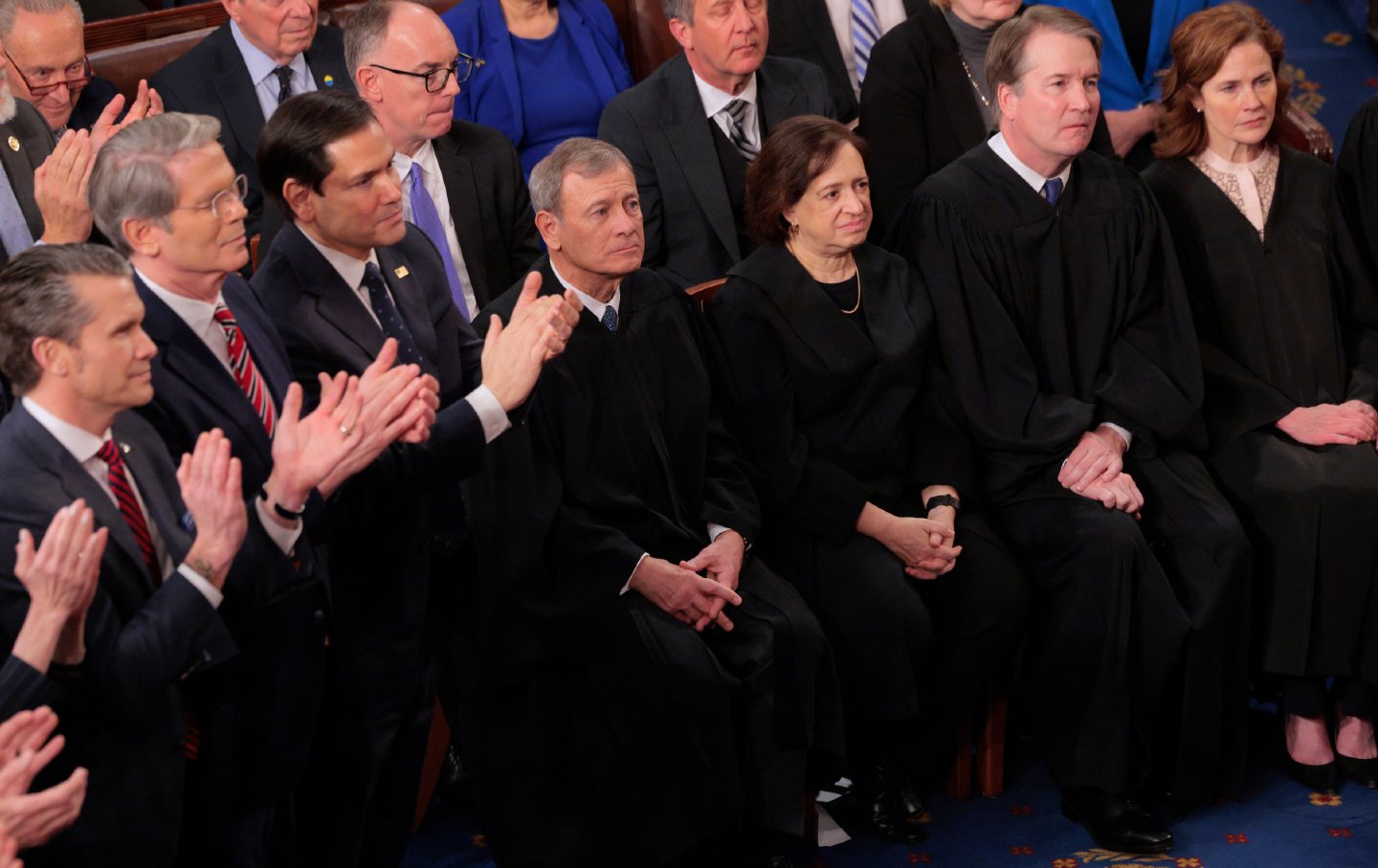The Road to a Democratic Congress Could Run Through Alabama
A court will intervene to create a second majority-Black district in a state that has used gerrymandering to boost the GOP.

A line of people wait outside the federal courthouse in Birmingham, Ala., on Monday, August 14, 2023, to watch a redistricting hearing.
(Kim Chandler / AP)If Joe Biden is reelected in 2024, his ability to govern as anything more than a lame duck will be determined by whether Democrats control both chambers of Congress. Biden’s party has the Senate, and, despite a seemingly daunting 2024 landscape, it could retain control thanks in no small measure to lucky breaks when it comes to candidate recruitment in key states. Republicans currently hold the House with a 222-212 advantage. But the balance in that chamber could shift next year, thanks to boosted turnout in a presidential year and the continuing power of abortion rights as an issue that shifts swing voters to the Democratic column and draws progressive young voters to the polls. But an even more tangible advantage for Democrats will extend from the redrawing of gerrymandered congressional district lines to give the president’s party a fairer playing field in 2024 House elections.
A court-ordered reworking of district lines in New York State could hand Democrats an opportunity to flip as many as six seats that are currently held by Republicans, and there is a chance the newly progressive Wisconsin Supreme Court could draw maps that make two currently Republican seats winnable for the Democrats. A challenge to the gerrymandering of Utah maps in a way that slices Democratic Salt Lake County into four parts could yield another Democratic seat. So, too, should a Florida state court’s attempt to upend a plan by Republican Governor Ron DeSantis and his partisan allies to eliminate a majority-Black Democratic district representing several of the Sunshine State’s northern counties.
At the same time, however, scheming by a newly conservative court in North Carolina could force the adoption of maps that might make as many as three currently Democratic seats vulnerable. And wrangling in Ohio, which has already been dramatically gerrymandered to favor the Republicans, could put two more Democratic seats in play.
Do the math and it quickly becomes clear that court-ordered redistricting in advance of the 2024 election could put control of the House on a knife’s edge, where the outcome of just one race could decide which party gets control. And a federal court decision on Tuesday raised the prospect that the race could be in a relatively unexpected place: Alabama. What’s more, that seat would very probably go to a Democrat. If that happens, argues the Alabama Democratic Party, the state’s voters could “tip the balance of power in Washington.”
Alabama is a deep-red state that gave Donald Trump 62 percent of its votes in 2020. But 37 percent of the vote went to Biden, who won 11 predominantly Black counties and carried two others where Black voters, in combination with Hispanics, Asian Americans, and others, form a majority of the electorate.
Yet, despite the fact that Democrats regularly win more than a third of the vote statewide, and the fact that the state elected former US senator Doug Jones with 50 percent of the vote in 2017, the party holds only one of the state’s seven US House seats—meaning they control a mere 14 percent of Alabama’s congressional delegation.
That delegation is currently comprised of six very conservative Republican white men and one Black woman, Democrat Terri Sewell, even though Black voters make up roughly 27 percent of the state’s electorate.
The antidemocratic nature of the congressional-district lines in the state is so extreme that, in June, the conservative-dominated US Supreme Court determined that Alabama’s gerrymandered maps were in violation of the Voting Rights Act and that the Republican-controlled state legislature had abused its power by denying Black voters a reasonable chance to elect a second representative. That groundbreaking decision—which could yet influence cases involving the gerrymandering of other Southern states such as Georgia—should have led to fairer maps for Alabama. But Republicans in the legislature refused to draw such maps, instead maintaining the gerrymander.
So, on Tuesday, a three-judge panel of federal jurists that has been overseeing the case issued an order that fair maps must be drawn. In scathing language, US Circuit Judge Stanley Marcus, US District Judge Anna Manasco, and US District Judge Terry Moorer announced that they were “deeply troubled that the State enacted a map that the State readily admits does not provide the remedy we said federal law requires.”
“We are not aware of any other case in which a state legislature—faced with a federal court order declaring that its electoral plan unlawfully dilutes minority votes and requiring a plan that provides an additional opportunity district—responded with a plan that the state concedes does not provide that district,” wrote the judges. “The law requires the creation of an additional district that affords Black Alabamians, like everyone else, a fair and reasonable opportunity to elect candidates of their choice. The 2023 Plan plainly fails to do so.”
The judges have taken charge of the process, ordering a special master and a cartographer to draw new maps that include two districts where Black voters could reasonably be projected to elect representatives they favor. Those maps are due September 25.
There will, undoubtedly, be more appeals by the state. But the pattern of decisions at the US Circuit Court and Supreme Court levels suggest the very real possibility that Alabama will elect two Black Democrats to the US House in 2024. And, while there are no guarantees of where overall voting in House races will go, the Alabama Democratic Party announced Tuesday that “Alabama Democrats have the opportunity to help President Biden make even more meaningful changes in this country by retaking the House.”
Hold the powerful to account by supporting The Nation
The chaos and cruelty of the Trump administration reaches new lows each week.
Trump’s catastrophic “Liberation Day” has wreaked havoc on the world economy and set up yet another constitutional crisis at home. Plainclothes officers continue to abduct university students off the streets. So-called “enemy aliens” are flown abroad to a mega prison against the orders of the courts. And Signalgate promises to be the first of many incompetence scandals that expose the brutal violence at the core of the American empire.
At a time when elite universities, powerful law firms, and influential media outlets are capitulating to Trump’s intimidation, The Nation is more determined than ever before to hold the powerful to account.
In just the last month, we’ve published reporting on how Trump outsources his mass deportation agenda to other countries, exposed the administration’s appeal to obscure laws to carry out its repressive agenda, and amplified the voices of brave student activists targeted by universities.
We also continue to tell the stories of those who fight back against Trump and Musk, whether on the streets in growing protest movements, in town halls across the country, or in critical state elections—like Wisconsin’s recent state Supreme Court race—that provide a model for resisting Trumpism and prove that Musk can’t buy our democracy.
This is the journalism that matters in 2025. But we can’t do this without you. As a reader-supported publication, we rely on the support of generous donors. Please, help make our essential independent journalism possible with a donation today.
In solidarity,
The Editors
The Nation








